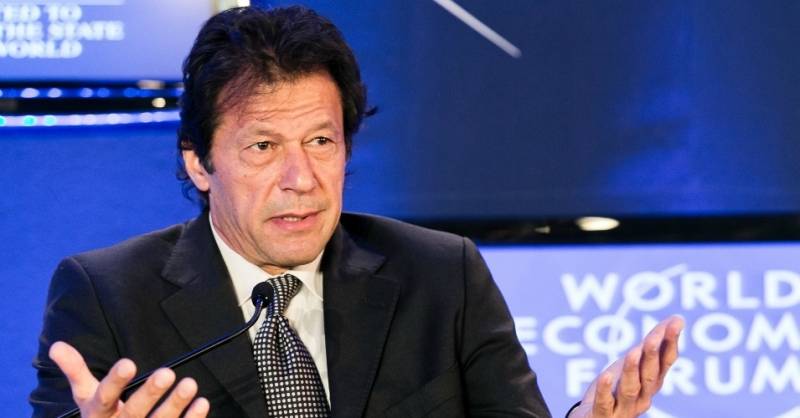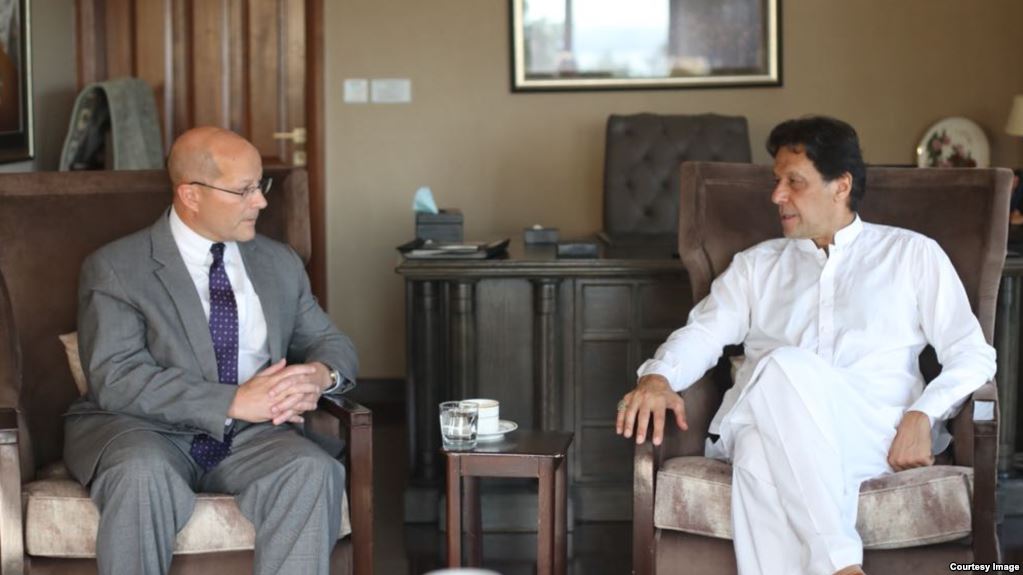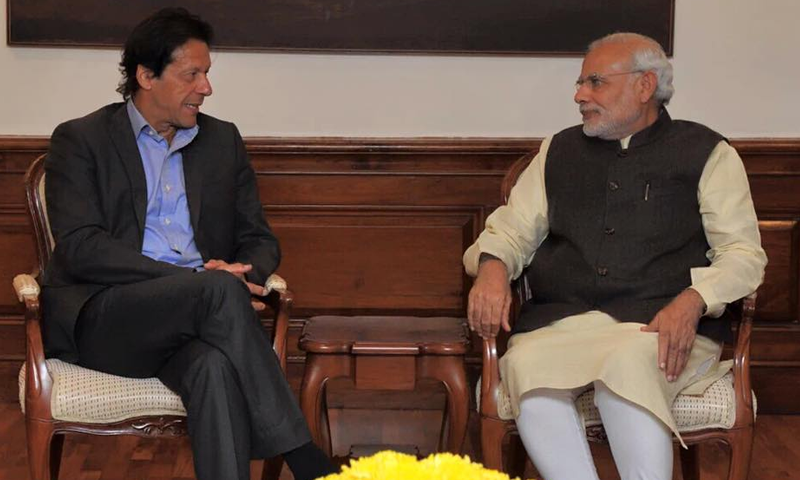
By Kunwar Khuldune Shahid
Prime Minister designate Imran Khan made all the right noises in his victory speech after unofficial results had confirmed that his party is set to lead the next federal government. Among the many things appreciable was the progressive foreign policy that he touched upon in his address.
Congratulations have poured down from around the world for Khan, including the neighboring Afghanistan, China and India – the latter via Prime Minister Narendra Modi who’d be fully aware of how his name had become a pre-poll cuss word used by all parties. And it is how Khan reconciles with the world that Pakistan has alienated over the past few decades – most importantly the immediate South Asian neighborhood in its entirety – that will define his political legacy.
https://www.youtube.com/watch?v=k-z2_5WKtEI
Diplomacy for security
One reason why diplomacy would define Imran Khan’s tenure is because how intrinsically linked it is to the security policy, which of course the Army leadership have complete hegemony over. Islamabad’s boomeranging security policies have not only resulted in creating volatility within the country, it has resulted in every single country that shares a border with Pakistan accusing it of cross-border terrorism.
While New Delhi and Kabul continue to accuse Pakistan of breeding militant groups as strategic assets to target Indian-held Kashmir and Afghan territory adjacent to the Durand Line, even Tehran and Beijing have asked Islamabad to get a grip over jihadist militancy that has spilled over in Iran and China.
Last year, Iran threatened to strike militant ‘safe havens’ inside Pakistani territory after ten Iranian border guards were killed by jihadists based in Pakistan. Similarly, China has repeatedly asked Pakistan to keep track of jihadists that overlap with radical Islamists in the bordering Xinjiang province to fuel the East Turkestan Islamic Movement.
While these cross-border spillovers might be a combination of both the ‘good’ and ‘bad’ Taliban, the fact that every single neighboring country has accused Pakistan of not doing enough to curtail jihadist terror – albeit in varying tones – says that notwithstanding the policy’s inherent paradox, selective use of jihadists as diplomatic tools has grotesquely failed.
Fiscal diplomacy
Similar to security, the economy is also an integral part of Pakistan’s foreign policy, as exemplified by the US Secretary of State Mike Pompeo warning the International Monetary Fund (IMF) against bailing Pakistan out of its economic crisis.
Pakistan’s relations with both China and Saudi Arabia are also based on economic needs, which the former has increasingly taken over, as exemplified by the recent $2 billion loan which halted the rupee’s nosedive.
In reaching out to India in his victory speech, and underlining the benefits of trade between the two South Asian rivals, Khan has touched upon what is simultaneously a solution to many of Pakistan’s fiscal woes, and the single biggest focal point for all the inertial forces in policymaking.
For while a market of over billion people would be an economic reincarnation for Islamabad, and the death for its suicidal security policy, open trade between India and Pakistan isn’t just against the interests of the Army, it would also contradict Chinese financial hegemony in the region.
Balancing act
Even so, what China doesn’t want either is India and Pakistan on the brink of a nuclear war at the heart of the One Belt One Road (OBOR), nor does it approve of Islamabad using jihadist assets to drive home its political interests against India, most notably in Kashmir.
Therefore, while Beijing would absolutely want to challenge the growing Washington-New Delhi alliance, which requires a Pakistan that is completely dependent on China, Imran Khan should realize that the days of rigid rival alliances going against each other were left behind in the 20th century.

What this means is that just like the balancing act between Saudi Arabia and Iran – which has been a perpetual fixture in Islamabad’s foreign policy, and perpetually binned in exchange for petro-riyals – Pakistan ideally shouldn’t be a permanent resident of either of the two super-camps between China and US.
In this regard, Khan’s message for the US – in complete contrast to his two-decade long confrontational position vis-à-vis Washington – was accurately scripted.
While Islamabad might be too far deep into the Chinese clenched fist to not be taken for granted by Beijing, a successful peace process in Afghanistan coupled with Pakistan further purging out jihadist groups – which incidentally the interest of pretty much every state that Islamabad concerns itself with, most of all – would ensure that Pak-US ties would improve.
Kashmir and India
Just like improvement in relations with the US would entail Washington not singling out Pakistan as the root of volatility in South Asia – to begin with – amelioration of ties with India would have begun once a calendar year passes without anything resembling a threat for nuclear war.

With relations as they are between the two countries, there of course is vast swathes of diplomatic spheres where progressive baby steps can be taken.
Even so, the Kashmir conflict has been cited over the past seven decades without the resolution of which India and Pakistan will never trace tangible peace. This is the single greatest lie spread ubiquitously in any narrative espoused by Pakistan since its inception, and whispered by the Army across the border as an idea integral to its financial interests as well.
If anything, the only way the Kashmir issue is going to be resolved is when all forms of working diplomatic relations exist between India and Pakistan, which would make the disputed territory a volatile anomaly that both sides would want to address.
For, as things stand, it is only Pakistan – and indeed the population of Kashmir – that wants the conflict addressed, while India is perfectly happy maintaining the status quo.
Enter Imran
From the United Nations General Assembly to the Organization of Islamic Cooperation, Pakistan has brought up Kashmir on every forum with a failure to generate sufficient interest across the board. If anything, it is Indian narrative on Kashmir that the world is increasingly buying, owing in large part to jihadist militancy originating in Pakistan and taking over Indian-administered Kashmir as well.
However, notwithstanding the imprudent narratives that he has been floating for political mileage in the past, in Imran Khan Pakistan now arguably has its most engaging world leader since Zulfiqar Ali Bhutto. And even more than the anti-corruption crusades that he has bellowed to fight domestically, it is representing Pakistan around the globe that Khan can’t wait to take up.
Even so, he knows fully well that he owes his current position – much like his predecessors at some point in time – to the Army leadership’s support. Fulfilling anything remotely resembling the ideas he flaunted in his victory address would require alienating his hitherto backers.
Prime Minister designate Imran Khan made all the right noises in his victory speech after unofficial results had confirmed that his party is set to lead the next federal government. Among the many things appreciable was the progressive foreign policy that he touched upon in his address.
Congratulations have poured down from around the world for Khan, including the neighboring Afghanistan, China and India – the latter via Prime Minister Narendra Modi who’d be fully aware of how his name had become a pre-poll cuss word used by all parties. And it is how Khan reconciles with the world that Pakistan has alienated over the past few decades – most importantly the immediate South Asian neighborhood in its entirety – that will define his political legacy.
https://www.youtube.com/watch?v=k-z2_5WKtEI
Diplomacy for security
One reason why diplomacy would define Imran Khan’s tenure is because how intrinsically linked it is to the security policy, which of course the Army leadership have complete hegemony over. Islamabad’s boomeranging security policies have not only resulted in creating volatility within the country, it has resulted in every single country that shares a border with Pakistan accusing it of cross-border terrorism.
Notwithstanding the policy’s inherent paradox, selective use of jihadists as diplomatic tools has grotesquely failed
While New Delhi and Kabul continue to accuse Pakistan of breeding militant groups as strategic assets to target Indian-held Kashmir and Afghan territory adjacent to the Durand Line, even Tehran and Beijing have asked Islamabad to get a grip over jihadist militancy that has spilled over in Iran and China.
Last year, Iran threatened to strike militant ‘safe havens’ inside Pakistani territory after ten Iranian border guards were killed by jihadists based in Pakistan. Similarly, China has repeatedly asked Pakistan to keep track of jihadists that overlap with radical Islamists in the bordering Xinjiang province to fuel the East Turkestan Islamic Movement.
While these cross-border spillovers might be a combination of both the ‘good’ and ‘bad’ Taliban, the fact that every single neighboring country has accused Pakistan of not doing enough to curtail jihadist terror – albeit in varying tones – says that notwithstanding the policy’s inherent paradox, selective use of jihadists as diplomatic tools has grotesquely failed.
Fiscal diplomacy
Similar to security, the economy is also an integral part of Pakistan’s foreign policy, as exemplified by the US Secretary of State Mike Pompeo warning the International Monetary Fund (IMF) against bailing Pakistan out of its economic crisis.
Pakistan’s relations with both China and Saudi Arabia are also based on economic needs, which the former has increasingly taken over, as exemplified by the recent $2 billion loan which halted the rupee’s nosedive.
In reaching out to India in his victory speech, and underlining the benefits of trade between the two South Asian rivals, Khan has touched upon what is simultaneously a solution to many of Pakistan’s fiscal woes, and the single biggest focal point for all the inertial forces in policymaking.
For while a market of over billion people would be an economic reincarnation for Islamabad, and the death for its suicidal security policy, open trade between India and Pakistan isn’t just against the interests of the Army, it would also contradict Chinese financial hegemony in the region.
Balancing act
Even so, what China doesn’t want either is India and Pakistan on the brink of a nuclear war at the heart of the One Belt One Road (OBOR), nor does it approve of Islamabad using jihadist assets to drive home its political interests against India, most notably in Kashmir.
Therefore, while Beijing would absolutely want to challenge the growing Washington-New Delhi alliance, which requires a Pakistan that is completely dependent on China, Imran Khan should realize that the days of rigid rival alliances going against each other were left behind in the 20th century.

What this means is that just like the balancing act between Saudi Arabia and Iran – which has been a perpetual fixture in Islamabad’s foreign policy, and perpetually binned in exchange for petro-riyals – Pakistan ideally shouldn’t be a permanent resident of either of the two super-camps between China and US.
In this regard, Khan’s message for the US – in complete contrast to his two-decade long confrontational position vis-à-vis Washington – was accurately scripted.
While Islamabad might be too far deep into the Chinese clenched fist to not be taken for granted by Beijing, a successful peace process in Afghanistan coupled with Pakistan further purging out jihadist groups – which incidentally the interest of pretty much every state that Islamabad concerns itself with, most of all – would ensure that Pak-US ties would improve.
Kashmir and India
Just like improvement in relations with the US would entail Washington not singling out Pakistan as the root of volatility in South Asia – to begin with – amelioration of ties with India would have begun once a calendar year passes without anything resembling a threat for nuclear war.

With relations as they are between the two countries, there of course is vast swathes of diplomatic spheres where progressive baby steps can be taken.
Even so, the Kashmir conflict has been cited over the past seven decades without the resolution of which India and Pakistan will never trace tangible peace. This is the single greatest lie spread ubiquitously in any narrative espoused by Pakistan since its inception, and whispered by the Army across the border as an idea integral to its financial interests as well.
If anything, it is Indian narrative on Kashmir that the world is increasingly buying, owing in large part to jihadist militancy originating in Pakistan and taking over Indian-administered Kashmir as well.
If anything, the only way the Kashmir issue is going to be resolved is when all forms of working diplomatic relations exist between India and Pakistan, which would make the disputed territory a volatile anomaly that both sides would want to address.
For, as things stand, it is only Pakistan – and indeed the population of Kashmir – that wants the conflict addressed, while India is perfectly happy maintaining the status quo.
Enter Imran
From the United Nations General Assembly to the Organization of Islamic Cooperation, Pakistan has brought up Kashmir on every forum with a failure to generate sufficient interest across the board. If anything, it is Indian narrative on Kashmir that the world is increasingly buying, owing in large part to jihadist militancy originating in Pakistan and taking over Indian-administered Kashmir as well.
However, notwithstanding the imprudent narratives that he has been floating for political mileage in the past, in Imran Khan Pakistan now arguably has its most engaging world leader since Zulfiqar Ali Bhutto. And even more than the anti-corruption crusades that he has bellowed to fight domestically, it is representing Pakistan around the globe that Khan can’t wait to take up.
Even so, he knows fully well that he owes his current position – much like his predecessors at some point in time – to the Army leadership’s support. Fulfilling anything remotely resembling the ideas he flaunted in his victory address would require alienating his hitherto backers.
